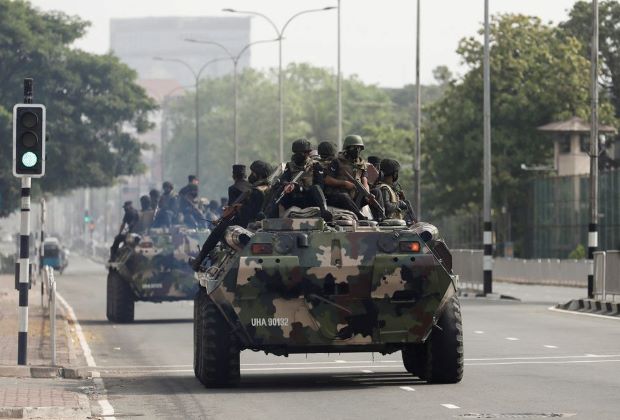Sri Lanka on alert ahead of anti-government rally
COLOMBO – Thousands of heavily armed troops were deployed in Sri Lanka’s capital Friday (8) ahead of a planned rally demanding the ouster of embattled President Gotabaya Rajapaksa.
The island nation is suffering through an unprecedented financial crisis, and its 22 million people have endured runaway inflation, prolonged blackouts, and shortages of fuel and other essential goods since the start of the year.
Demonstrators have for months been camped outside Rajapaksa’s Colombo office to demand his resignation for economic mismanagement.
Soldiers armed with assault rifles were bussed into Colombo to reinforce police guarding Rajapaksa’s official residence, which anti-government protesters have vowed to storm on Saturday (9).
“An operation involving nearly 20,000 troops and policemen and women was launched this afternoon,” a top defence official told AFP. “We are hoping that tomorrow’s protest will not become violent.”
He said more troops were brought into the capital from the provinces after at least three judges refused to outlaw Saturday’s protests.
The United Nations urged both the Sri Lankan authorities and the protesters to ensure that Saturday’s demonstrations went off peacefully.
“We urge Sri Lankan authorities to show restraint in the policing of assemblies and ensure every necessary effort to prevent violence,” the Office of the UN High Commissioner for Human Rights said.
Ravina Shamdasani, the spokesperson for the UN High Commissioner for Human Rights, in a statement issued on Friday, also appealed to the organizers of the protests and their supporters to engage in peaceful means of protest and not to impede essential medical or humanitarian services.
“We also call on the authorities to give clear instructions to the security forces that human rights defenders and journalists have a right to monitor and report on the demonstrations and therefore should be protected in the exercise of these functions and not obstructed in any way,” the statement urged, noting that the worsening economic situation has led to increasing tensions in the last weeks, and that the Office had received reports of several confrontations between individuals and members of the police force and the armed forces at fuel stations where thousands of desperate members of the public have queued for hours and sometimes days.
Shamdasani also noted that the police have used tear gas and water cannon at times in an unnecessary and disproportionate manner and that on occasions, armed forces have also fired live ammunition.
“All Sri Lankans have the right of freedom of expression, peaceful assembly and the right to participate in public affairs, which are particularly important in critical phases of the nation’s life. Under applicable international law, gatherings can only be dispersed in exceptional cases, with use of force a last resort where absolutely necessary and proportionate,” the statement emphasized, reiterating that as a general rule, the military should not be used to police assemblies.
Nine people were killed and hundreds wounded when clashes erupted across the country after Rajapaksa loyalists attacked peaceful protesters outside the president’s office in May.
Sri Lanka has defaulted on its $51 billion external debt and has been in bailout talks with the International Monetary Fund.
AFP/ENCL


